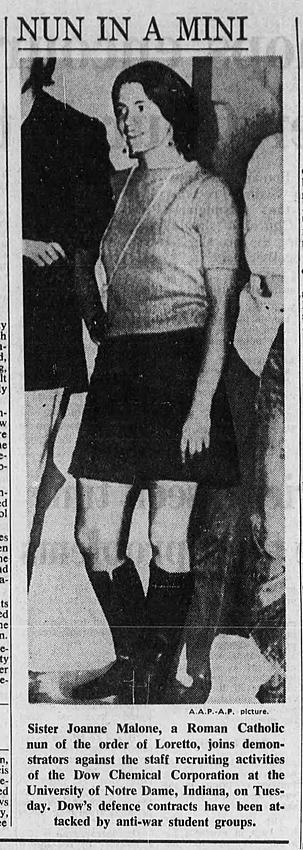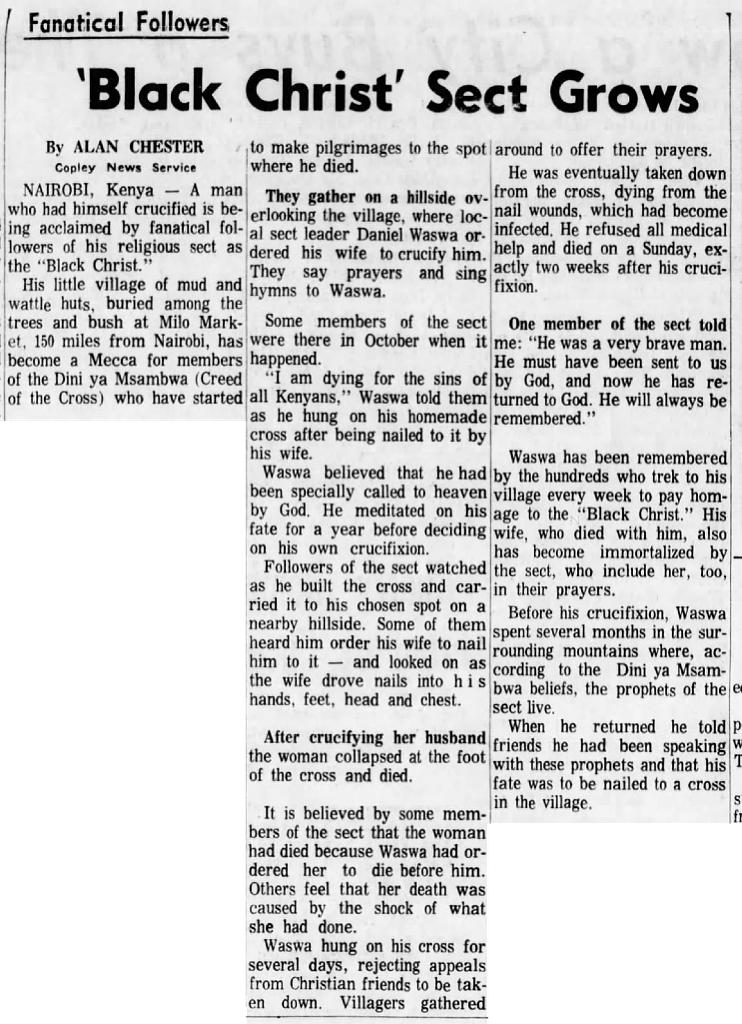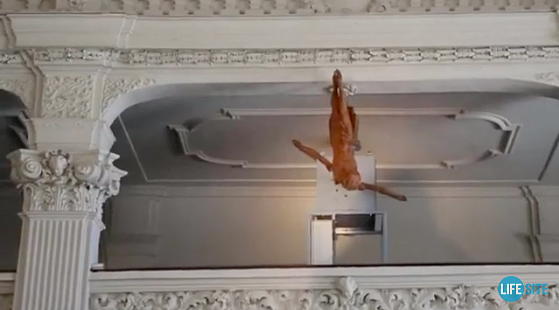Religion
Nun in a miniskirt
November 1969: The fact that Sister Joann Malone of the Order of Loreto was protesting wasn't particularly big news, but the fact that she was wearing a miniskirt as she did so was front-page news.
Sydney Morning Herald - Nov 21, 1969

Decatur Herald - Nov 20, 1969
Her superior, Sister Rose Maureen Sanders, head of the St. Louis province of the Sisters of Loreto, wasn’t too happy about the fashion decision. From a follow-up article:
“I regretted the photo when I saw it in newspapers here and thought her wearing a miniskirt was ridiculous,” said the provincial superior.
“It’s an aberration on her part. Many, many sisters are wearing modern clothes but would not choose a miniskirt. Why do the newspapers print things like that?”
Posted By: Alex - Thu Sep 12, 2019 -
Comments (5)
Category: Fashion, Religion, Nuns, 1960s
Water Walk Cancelled
The laws of physics weren't going to stop him, but a bullet in the leg did.Failed attempts to walk on water definitely are a recurring theme in weird news. See also: When Yogi Rao failed to walk on water

The Shreveport Times - May 22, 1972
Posted By: Alex - Wed Aug 07, 2019 -
Comments (0)
Category: Frauds, Cons and Scams, Religion, 1970s
The Devil Wants You Fat
A scriptural approach to a trim and attractive body… working with the Lord, you’ll harness the POWER of your body’s own computer system to make you eat the kinds of foods you should and in the right amounts.For more details of Lovett's devil-fighting diet regimen, you can borrow and read his 1977 book online for free via archive.org.


Posted By: Alex - Thu Jul 18, 2019 -
Comments (0)
Category: Religion, 1970s, Dieting and Weight Loss
Did Jesus Poop?
It's one of the more perplexing questions in Christian theology. A recent article in The Daily Beast explains why, over the centuries, the issue has kept rearing its head:There's also a book, published in 2018, with that title (amazon link). I have no idea of its quality (never having read it), but sometimes a title alone can be worth the price of purchase. For instance, the book sounds perfect to include among the reading material in a guest bathroom.

Posted By: Alex - Fri Jul 05, 2019 -
Comments (5)
Category: Religion, Books, Excrement
Man sues God
Donald Drusky, of McKeesport, Pa. (which happens to be my mother’s hometown) specifically wanted God “to grant him the guitar-playing skills of famous guitarists, along with resurrecting his mother and his pet pigeon.”Suing God, and perhaps even winning, would seem to be the easy part. Collecting payment is what’s hard.

Asbury Park Press - Mar 16, 1999
Posted By: Alex - Sat May 18, 2019 -
Comments (2)
Category: Religion, Lawsuits, 1990s
Weeping Gum Tree
In Perth, Australia water mysteriously began flowing out of a gum tree on Easter weekend. Many suggested it must be some kind of divine message. Investigation by city workers uncovered a more mundane explanation: a broken water pipe underground.
Posted By: Alex - Fri May 03, 2019 -
Comments (0)
Category: Religion
Happy Easter 2019!
Not sure if Jesus sanctions fairies and gnomes as part of His holiday.
Posted By: Paul - Sun Apr 21, 2019 -
Comments (0)
Category: Holidays, Easter, Religion, Fantasy, Fictional Monsters
Muskrat allowed
Submitted by Jenny Beatty, from USA Today, April 17, 2019.Luckily for the Catholics in Detroit, we here at WU have their muskrat-cooking needs covered, having previously posted the recipe for Cream of Muskrat Casserole, as well as how to find the full cookbook Recipes for cooking muskrat meat.

Posted By: Alex - Sat Apr 20, 2019 -
Comments (1)
Category: Food, Religion
Crucified by his wife
The strange case of Daniel Waswa, a member of the Dini ya msambwa sect, who imagined that God had ordered him to die on the cross “for the sins of all Kenyans.” So he had his wife nail him to a cross, which she did. She then promptly dropped dead (of shock?). As for him:I'd never heard of the Dini ya msambwa sect before, but some googling reveals that the name is better translated as "Religion of the Ancestral Customs" (not Creed of the Cross). It was founded by Elijah Masinde. The stories about Waswa make it sound like a radical Christian cult, but Wikipedia defines it as "an African traditional religion that has been labeled an anti-colonial religion."

The Ottawa Citizen - Oct 29, 1965

San Bernardino County Sun - Jan 7, 1966
Posted By: Alex - Sat Apr 06, 2019 -
Comments (0)
Category: Religion, 1960s
Jesus Clock
Created by artist Manfred Erjautz and installed in the Spitalskirche in downtown Innsbruck, with the permission of Bishop Hermann Glettler.More details: Life Site

Posted By: Alex - Sun Mar 24, 2019 -
Comments (4)
Category: Religion

| Who We Are |
|---|
| Alex Boese Alex is the creator and curator of the Museum of Hoaxes. He's also the author of various weird, non-fiction, science-themed books such as Elephants on Acid and Psychedelic Apes. Paul Di Filippo Paul has been paid to put weird ideas into fictional form for over thirty years, in his career as a noted science fiction writer. He has recently begun blogging on many curious topics with three fellow writers at The Inferior 4+1. Contact Us |




